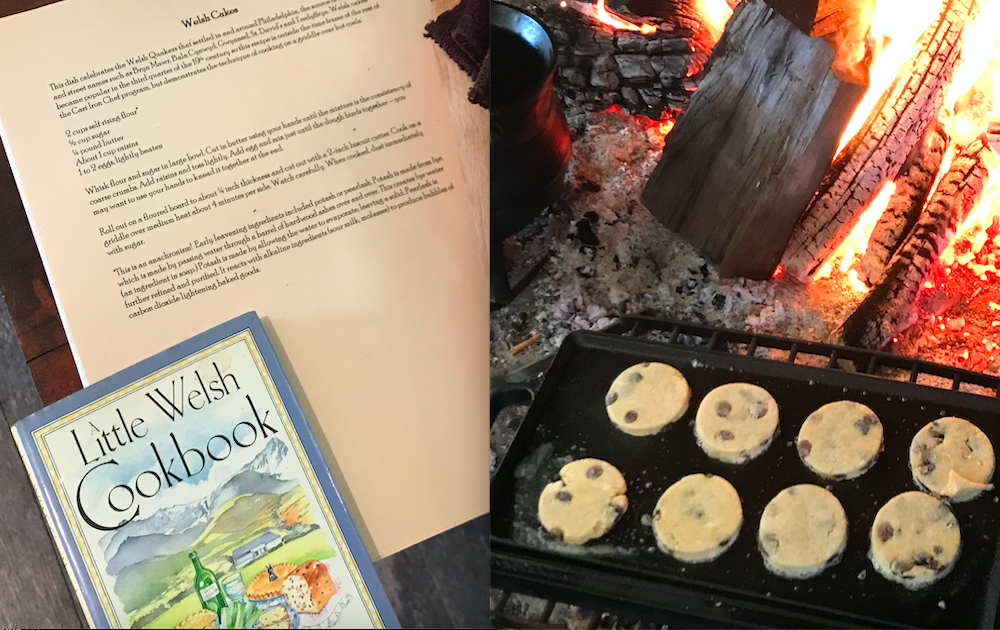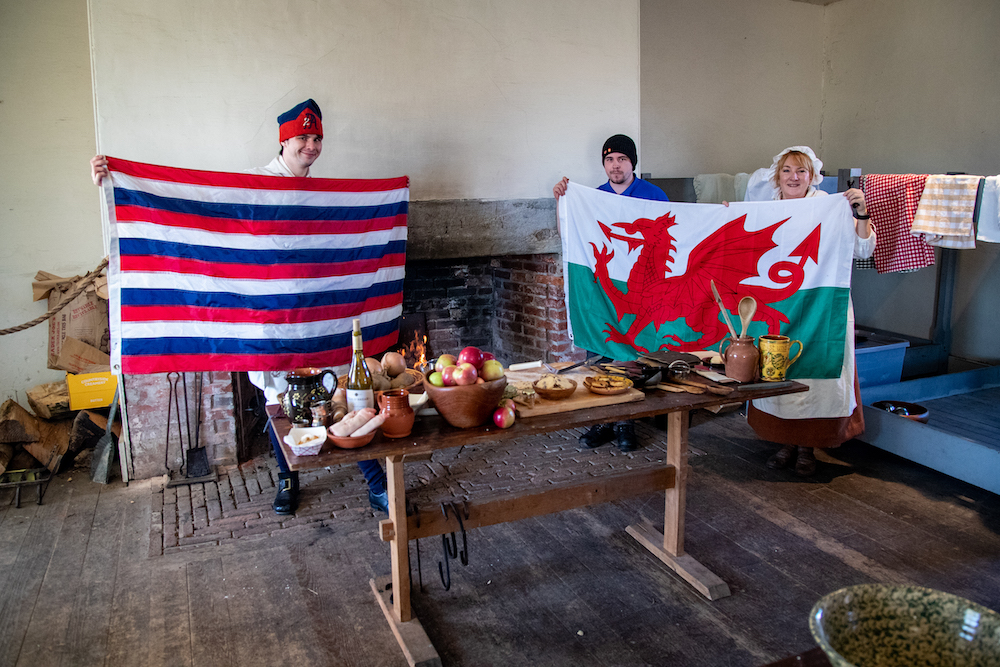The little corner of America importing a slice of Wales

David Owens
If the way to a man’s heart is through his stomach, then the way to get an American interested in the history of Wales is by feeding them Welsh cakes.
That was evidently the idea of a recent event held at Fort Mifflin on the Delaware in Philadelphia, which aimed to tell the history of the Welsh heritage of the area while sampling some of Wales’ finest baked goods.
Fort Mifflin is a Revolutionary War era fort originally constructed in 1771, and saw service all the way until 1954. It is also key in telling the story of the Philadelphia Welsh.
Philadelphia is the largest city in the state of Pennsylvania, one of the first areas Welsh speaking Quakers settled in the early 1680s.
To entice guests to create some edible treats while learning more about Welsh culture, the fort hosted an event called ‘Cast Iron Chef’.

At the event, apprentice chefs signed up to learn old fashioned ways of cooking with cast iron the way it was done in the 18th century.
“One of the feature items we chose for the apprentice chefs to cook were Welsh cakes,” said Fort MIfflin tour guide, Connor Duffy.
“They’re delicious and simple to make, and a nice nod to the Welsh history of Philadelphia and the surrounding area, known as the Welsh tract.
“We typed up a nice pamphlet with the recipe for them and handed it to guests, which also explained a bit about the Welsh history of the area.”
Welsh treats
Throughout the whole day, Welsh expat Matthew Rhys, who is from Carmarthenshire was teaching guests about Welsh history and what it’s like to live in Wales.
Connor and Matthew also spread the Welsh message on a local TV news station – and broadcast a little Welsh language to the masses.
“Matthew and I both made an appearance on live local TV the day before this event, and Matt actually spoke Welsh, saying ‘Bore Da Philadelphia’ to the many thousands of people watching that morning,” said Connor.
“The visitors absolutely loved the Welsh cakes, which basically none of them had tasted before,” he added. “A lot of them were wondering if they were a dessert or a snack food in Wales, and how common they were.
“Having visited Wales and seen them for sale everywhere, I compared them to how common Tastykakes, a beloved local snack/dessert food are here in the States.”
The apprentice chefs mixed the ingredients, rolled them out, and used a cutter to cut out the shapes. They were then cooked on a cast iron griddle in the original fireplace of the barracks.
“Beth Beatty, the fort’s executive director, brought the recipe for the Welshcakes, and also brought some Bara Brith she made herself,” said Connor. “Beth’s family is actually from Wales, so she herself has a lot of interest in Welsh heritage. One of her favorite memories as a kid was traveling to Wales and climbing the steps of Caernarfon Castle.
‘The guests really loved the Welshcakes. Some of the comments from the event we got included ‘Welshcakes- believe it or not, better than cookies!’ and ‘Cymru am byth! Thank you to these guys for sharing your knowledge and experience of Wales with us!’
Matthew and Connor are also involved in the Mari Lwyd in Philadelphia group, and in December they celebrated the traditional festive heritage of Wales at a Christmas folk fayre in the city centre with the Mari Lwyd the centre of attention.
The Mari Lwyd took their first foray into Philadelphia this winter to great reception, with help from a few local friends.
Many stopped to take pictures while it paraded around Love Park and City Hall, some shouting, “Look, it’s the Welsh thing!” Good stuff.
Diolch i bawb. pic.twitter.com/VSWEmvuwfc
— Mari Lwyd in Philadelphia (@MariLwydPhilly) January 1, 2022
“The whole thing was a joint effort between friends of ours from local groups,” said Matthew Rhys, speaking to Nation.Cymru last month.
“It involved friends from Fort Mifflin on the Delaware, The Griffith Morgan House, a really interesting estate with a Welsh origin story whose current proprietor, Robert Fisher-Hughes, is also of very proud Welsh heritage, and The Seadogs, a pirate sea shanty folk band from New Jersey who spiced the whole thing up with some old time wassailing songs on stage at the Philadelphia Christmas Village stage.
“We also produced and gave out small pamphlets with an explanation and history of the tradition to members of the public, including lyrics to the traditional Pwnco song (which accompanies the Mari Lwyd)
“We hope to bring Mari back as an annual event in the future, bigger and better each time.”
Unsurprisingly, the Mari Lwyd was met with some puzzling looks from those encountering the mystical Welsh figure with baubles for eyes, a mane of colourful streamers and white cloak flowing from her skull, attached to a pole held by a person inside it.
None more so than the people in a lift (or should that be elevator) who quite taken aback when they met the Mari Lwyd for the very first time.
Elevator shenanigans with some poor strangers. pic.twitter.com/Rre3T3LuWe
— Mari Lwyd in Philadelphia (@MariLwydPhilly) January 1, 2022
Their faces were a picture – but at least these surprised Americans will never forget their first encounter with one of the most distinctive characters in Welsh folklore.
Well done to all those Stateside Welsh for keeping our history and tradition alive.
Da iawn pawb!
Support our Nation today
For the price of a cup of coffee a month you can help us create an independent, not-for-profit, national news service for the people of Wales, by the people of Wales.






The article didn’t mention if the Welsh Cakes (teisen llechan in South Wales) were served up North Wales style – with butter on them, or South wales style – sprinkled with sugar.